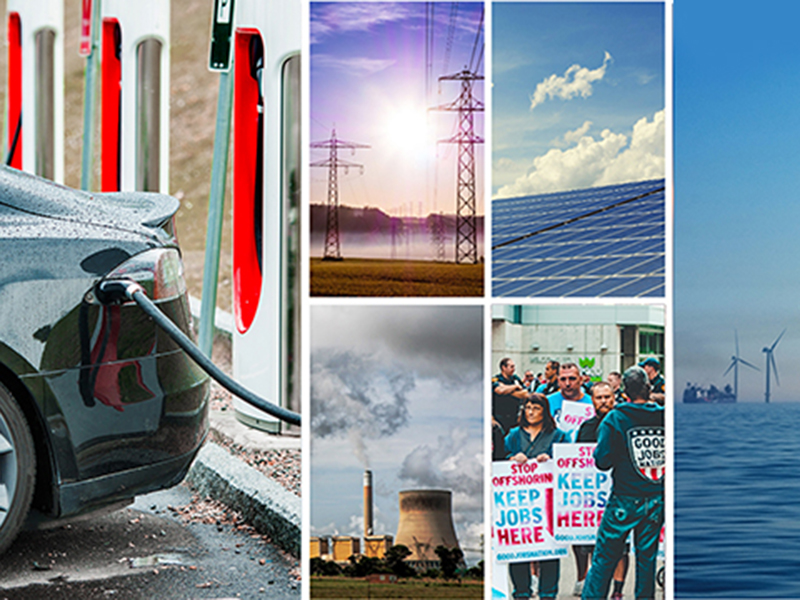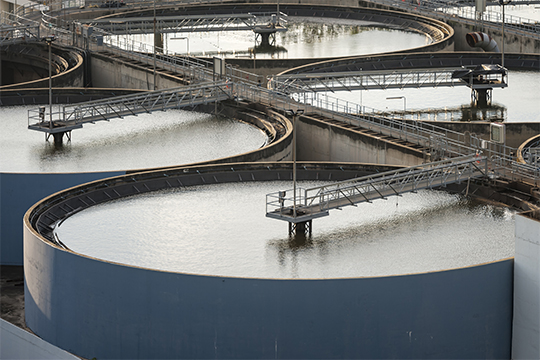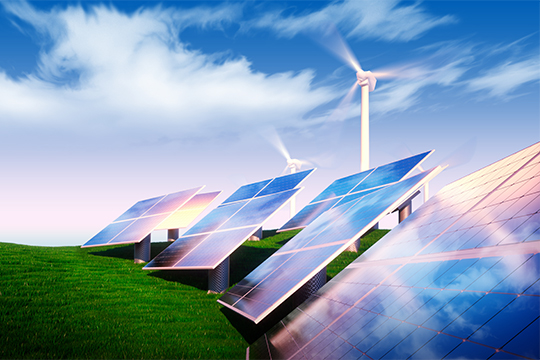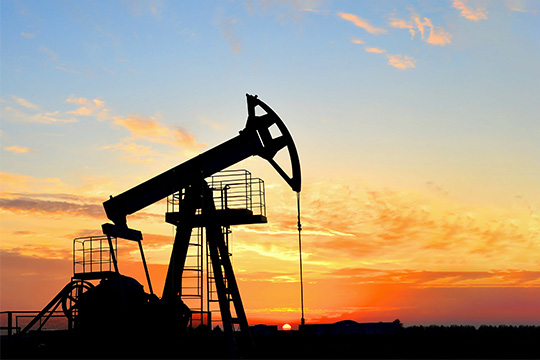Spring 2022 ENE Course Offerings
The Andlinger Center for Energy and the Environment is pleased to announce the following ENE courses for Spring 2022.
Renewable Energy and Smart Grids
Minjie Chen
ENE 273 / ECE 273
This course explores broadly renewable energy systems and smart grids. Technical and operational principles of the modern electric grids will be introduced, followed by an overview of various energy sources from fossil-fuel generators to photovoltaic systems. The intermittency of renewable energy systems and its impact on the electric grid will be discussed together with its potential solutions: energy storage systems and demand response techniques. Emerging techniques, such as micro-grids and plug-in-electric vehicles will be reviewed. Economics and public-policy issues will be explored.
Fundamentals of Biofuels
José Avalos
ENE 318 / CBE 318 / ENV 351
What are biofuels, and why are we making them? How can they help address our energy needs in a warming planet? What are 1st, 2nd, and 3rd generation biofuels? What is the controversy surrounding the food versus fuel debate? Will thermocatalysis or genetic engineering improve biofuel production? Can we make biofuels directly from light or electricity? These are some of the questions we will answer through discussions during lecture. In precept we will discuss primary literature, relevant news reports, and studies on the socio-economic impact of biofuels.
Rapid Switch: The Energy Transition Challenge to a Low-carbon Future
Chris Greig & Eric Larson
ENE 372 / EGR 372 / ENV 372
The Paris Accord signaled a global consensus on climate risks and the need for a rapid switch to clean energy. Not well comprehended are the scale and pace of the needed transformations. Bottlenecks encountered during rapid, large-scale change, must be anticipated and addressed to achieve climate goals. Princeton’s Net-Zero America study (2021) provides highly-granular insights on the scale and pace of change and on impacts to the environment, finances, jobs and more. Students will build on that study to analyze sub-regional energy transitions through multi-disciplinary lenses to assure the successful decarbonization of the U.S.
Introduction to the Electricity Sector-Engineering, Economics, and Regulation
Jesse Jenkins
ENE 422 / MAE 422
This course provides an introduction to the electricity sector drawing on engineering, economics, and regulatory policy perspectives. It introduces the engineering principles behind various power generation technologies and transmission and distribution networks; the economics of electricity markets; and the regulation of electricity generation, transmission, distribution, and retail sales. Open challenges related to the growth of distributed energy resources, the transition to low-carbon electricity sources, and the role of the electricity sector in mitigating global climate change are also discussed.
Introduction to the Electricity Sector-Engineering, Economics, and Regulation
Jesse Jenkins
ENE 522 / MAE 533
This course provides an introduction to the electricity sector drawing on engineering, economics, and regulatory policy perspectives. It introduces the engineering principles behind various power generation technologies and transmission and distribution networks; the economics of electricity markets; and the regulation of electricity generation, transmission, distribution, and retail sales. Open challenges related to the growth of distributed energy resources, the transition to low-carbon electricity sources, and the role of the electricity sector in mitigating global climate change are also discussed.
Advanced Optimization Methods for Energy Systems Engineering
Christos Maravelias
ENE 570 / CBE 570 / MAE 570
The course will cover (1) basic theory, (2) modeling techniques, (3) basic algorithms and solution methods, and (4) software tools for optimization. We will also discuss how optimization methods can be used to design, analyze, and operate energy systems.
ENE Cross-listed Courses for Spring 2022
Green and Catalytic Chemistry
Michele Sarazen
CBE 421 / CHM 421 / ENE 421
Concepts of heterogeneous and homogeneous catalysis applied to current industrial processes associated with fuel production and manufacturing of chemicals. In particular, available routes for conversions using alternative, more sustainable feedstocks and processes will be discussed in the context of green chemistry and engineering principles. These case studies will serve as platforms to the fundamentals of heterogeneous acid and metal catalysis, including techniques of catalyst synthesis and characterization, as well as understanding of how reactions occur on surfaces.
Engineering Design for Sustainable Development
Siavash Isazadeh
CEE 477 / ENE 477
This course will focus on the sustainable design of urban wastewater infrastructure. Students will learn the principals of biological wastewater modelling and will use software packages and other design tools for design and upgrading existing water/wastewater treatment systems, including new processes that incorporate energy and resource recovery. The projects are considered from concept development to detailed design with special considerations on sustainability and resilience. Guest speakers from academia and industry will be invited to present the new advancements in research and technology.
Biology, Electrochemistry and Technology
Z. Jason Ren
CEE 564 / ENE 564
This course will focus on the sustainable design of urban wastewater infrastructure. Students will learn the principals of biological wastewater modelling and will use software packages and other design tools for design and upgrading existing water/wastewater treatment systems, including new processes that incorporate energy and resource recovery. The projects are considered from concept development to detailed design with special considerations on sustainability and resilience. Guest speakers from academia and industry will be invited to present the new advancements in research and technology.
Energy Technologies in the 21st Century
Lamyaa El-Gabry, Yiguang Ju
MAE 228 / EGR 228 / CBE 228 / ENE 228
This course will deal with issues of regional and global energy demands, sources, carriers, storage, current and future technologies and costs for energy conversion, and their impact on climate and the environment. Students will learn to perform objective cost-efficiency and environmental impact analyses from source to end-user on both fossil fuels (oil, coal, and natural gas), and alternative energy sources (bio-fuels, solar energy, wind, batteries, and nuclear). We will also pay particular attention to energy sources, technologies, emissions, and regulations for transportation. The course will also include tours to energy research labs.
Energy for a Greenhouse-Constrained World
Julia Mikhailova
MAE 328 / EGR 328 / ENV 328 / ENE 328
This course provides an overview of fundamental physical mechanisms behind sustainable energy technologies, including solar thermal, solar photovoltaic, wind, nuclear, and hydroelectricity. Physics of the greenhouse effect, projected Earth’s climate changes, as well as socio-economic impacts on energy uses and greenhouse-gas emissions are reviewed. Variability, dispatchability, and a real power density of energy resources are discussed. Energy efficiency, energy storage, as well as transmission and distribution of electric power are touched upon.
Virtual and Augmented Reality for Scientists, Engineers, and Architects
Alexander Glaser, Forrest Meggers
MAE 418 / ARC 418 / ENE 428
Virtual and augmented reality (VR/AR) technologies have seen tremendous growth and new applications over the past few years. Commercially available hardware and modern game engines can now support the work in many disciplines. In particular, VR and AR are enabling scientists, engineers, and architects to plan and conduct their research in fundamentally new ways, visualize and communicate their findings more effectively, and work in environments that are otherwise difficult, impossible, or too costly to experience in person. In this course, we will explore the basic concepts of effective VR/AR experiences and build the skills needed to develop and support innovative science, engineering, or architecture projects. Topics include position tracking, interactivity, haptics, and other aspects of human-computer interaction (including UX/UI) relevant for VR/AR. Case studies from science, engineering, and architecture will emphasize the role of game-physics engines to connect the material to real-world projects. In the second half of the semester, working in small teams, students develop and implement their own ideas for a VR/AR project of their choice. Projects can either start from a basic environment or model used earlier in the semester (such a motorcycle or aircraft engine or the walkthrough model of a building) or pursue entirely new projects connected to their interests. Presentation of final projects will place an emphasis on data visualization and effective communication of key findings and results. We will be working with Unreal Engine (UE5) and have available a number of virtual and augmented reality headsets for project development. We will be able to use the new VR Deck at Green Hall for hands-on lab sessions. Some experience with Unreal Engine (C++, Blueprint) and Blender is recommended but not required.
Heat Transfer
Daniel Nosenchuck
MAE 423 / ENE 423
This course will cover fundamentals of heat transfer and applications to practical problems in energy conversion and conservation, electronics, and biological systems. Emphasis will be on developing a physical and analytical understanding of conductive, convective, and radiative heat transfer, as well as design of heat exchangers and heat transfer systems involving phase change in process and energy applications. Students will develop an ability to apply governing principles and physical intuition to solve multi-mode heat transfer problems.
Energy Conversion and the Environment: Transportation Applications
Michael Mueller
MAE 427 / ENE 427
Overview of energy utilization in and environmental impacts of propulsion systems for ground and air transportation. Roughly half of the course will be devoted to reciprocating engines for ground transportation, and the other half of the course will be devoted to gas turbine engines for air transportation. The course will focus on device efficiency/performance and emissions with future outlooks for improvements in these areas including alternative fuels and alternative device concepts. Relevant thermodynamics, chemistry, fluid mechanics, and combustion fundamentals will be reviewed or introduced and will permeate the course material.
Combustion
Chung Law
MAE 531 / ENE 531
Chemical thermodynamics and kinetics, oxidation of hydrogen, hydrocarbons and alternate fuels, pollutant chemistry and control, transport phenomena, laminar premixed and nonpremixed flames, turbulent flames, ignition, extinction, and flammability phenomena, flame stabilization and blowoff, detonation and blast waves, droplet, spray and coal particle combustion, principles of engine operation.
Oil, Energy and The Middle East
Bernard Haykel
NES 366 / ENE 364 / ENV 366
Overview of the issues surrounding global energy supplies, oil’s unique physical and economic properties, and its role in shaping the political economy of the Middle East and U.S. strategic interests in the region. Discuss availability of energy sources, the state of technology, the functioning of energy markets, the challenges of coping with global climate change and the key role of the oil reserves in the Middle East. Then focus on the history of oil in the Middle East and its impact on societies in the region.
















